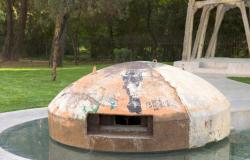
Bárbara Vitantonio (41) arrives at the Premier Pádel Santiago P1 conference room with the smile that always characterizes her. Before entering, he greets each of the security guards there, just as he does with anyone who passes by. After sitting down, she makes a request. “Can I disinfect the microphone? I always do it, so you don’t worry,” she says jokingly to AS Chile.. But who is ‘Bar’? Nothing more and nothing less than the official interviewer of the most important padel circuit in the world.
“I knew padel and I even played it in the ’90s in Argentina, but at a professional level I knew two or three names. This is what happened to me with national motorsports, I worked for 10 years, but at first I didn’t know anything. Premier Pádel knew it from the first moment. I didn’t know anything about this sport and it doesn’t mean that I know today, because I am very respectful of the places that each one occupies. and from colleagues who have been covering for a long time and then, with the protagonist and those around him. I try to learn, I listen and I see,” she says about his work where she interacts day by day with the stars of a sport that never stops growing.
Vitantonio was born in San Martín de Los Andesbut he always says that it is Inns because, for her, “one is from the place where one is raised and grows.” She arrived in that city in northern Argentina when she was only two years old, which is why she feels that way. She lived for 20 years in Buenos Aires, where she studied and had her first jobs on television, and for more than three years she has lived in Cagliari, Italy, where she settled with her husband, Martín Vassallo-Argüello, who has become a very important figure in tennis on the island of Sardinia.
Before leaving for Europe in the middle of the pandemic, he had to say goodbye to his mother, with whom he has a very close relationship, especially after the death of his father 15 years ago.. “My father was from Rosario, my mother (Vera) is Brazilian and she has raised me and my sister in the best possible way, very free,” she says. Vera stayed in Posadas and her sister ‘Car’ left for Canada, but they remain very close despite the distance.
– Within the freedom of choice, you decided not to be a mother. How does that thought arise?
– I always had that as quite firm. I love kids, I have two nephews who are my eyes for me, Emma and Franz, who are Canadian, but I always knew that I did not want to carry that responsibility that, surely, the mothers on the other side will tell me ‘but you’re missing out.’ best of life’ and I have no doubt that it must be the most beautiful and the best feeling that one can have, but it is a very deep topic for me in the sense that I have arguments. I understand what you’re getting at: I grew up in a family environment that did not have or dictate to me a mandate of ‘now you have to do this and you have to get married or you have to study this university degree.’ In fact, poor my father, may he rest in peace, I started four university degrees…
– Really?
– I finished two, but my dad always told me ‘why do you change so much, it can’t be, but focus on one and finish’… he was a little more structured (laughs). My mom was a bit ‘do what you want’ (laughs).
– What study?
– The first race I finished has to do with health. I am an instructor in Health, Food and Physical Activity at the school of Doctor (Alberto) Cormillot, who is a very recognized person in nutrition. And I didn’t pursue that career because as soon as I finished, I studied sports journalism. It took me years to realize that I wanted to make a living in the social sciences, basically communication. Because imagine that I did two years of Chemical Engineering in Posadas, that is, one thing has nothing to do with the other (laughs).
– How does your constant interest in learning come about? He arrived in Italy without knowing the language and today he masters it perfectly…
– We were always very curious in my house. My parents always told us that no matter what situation you experienced, you had to try to learn something more. To be a journalist you know that you have to be very curious, otherwise it is very difficult to develop the profession. I figure it all comes from the same thing. The family played a very important role. She was always the best student, a champion in primary school, in secondary school, but she was cool (nice) with my classmates (laughs). She did the tests on the kids… so the school directors don’t find out (laughs). Or she let them copy me.
-And does Cagliari have any Posadas?
– (Thinks for a few seconds and smiles) Your question is nice and no one had asked it to me yet (laughs). I find several similarities in terms of the number of inhabitants, Cagliari is smaller than Posadas today and as it is the capital of the island of Sardinia which is located in the middle of the Mediterranean, there is an almost tropical climate. The humidity and heat remind me a lot of Posadas. It’s hell: it’s 40 degrees with 95 percent humidity and it’s terrible.
“Injustice is something that makes my hair stand on end, I cannot tolerate it”
– What is the best thing about being you in the sense of a public figure? It is already recognized in the world paddle tennis environment…
– We can discuss the public figure thing (laughs), but I understand what you’re getting at. I think I’m the same, obviously with a certain formality in front of the microphones, but I’m the same and everyone can tell you that. I get to the office and shout ‘Hello, hello! Joy has arrived!’ I am very aware that, well… I think that in Argentine journalism sometimes there are certain characters who think that being on television gives you a right or exclusivity to something, which for me is a job like any other. . I am very considerate, yes. I put myself in other people’s shoes a lot. From the person who is in security or the transport that looks for us, for me the ‘hello, how are you? good day’ is the same as for the top player.
– And the worst?
-There is a cataract, a list of worse things (laughs). (Thinks for a few seconds) It’s difficult to talk about those things about yourself, especially the good ones. But as a personality I can tell you that the worst thing I have is that I am a spiteful person, which is very ugly. Less and less, I learn on a day-to-day basis, but I hardly forget if someone does something that I don’t like or is ugly, especially with my loved ones, I can’t stop there. I’m difficult at that. Well, I have a character that shows through and through.
– Are you completely happy or is something missing to make you feel this way?
– I am completely happy. My family tried to instill that in us, to enjoy what you do and where you are. Of course there are everyday situations that are not pretty or that something happens, but overall, I make the most of everything. Even losing such a close family member. I repeat it to you: I am completely happy, I understood that the law of life had to take my father and that does not mean I will have to be angry with those around me.





